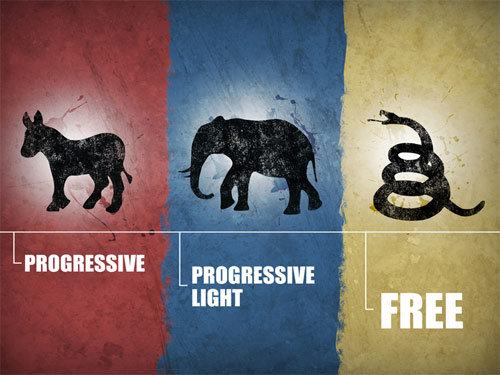“But I was born this way.”
 Time to re-engage. Since I seem to like hate mail, I figured to jump in with a splash.
Time to re-engage. Since I seem to like hate mail, I figured to jump in with a splash.
Recently, I was engaged in a lively argument/discussion about Rick Santorum’s little dustup at the Republican Debates. I referenced a GOProud press release (mostly ’cause I like the organization) that called Santorum out and demanded an apology. My original post (on a social networking site) read like this:
Not that he ever had my vote, but the cowardice in failing to simply answer the question up front, his entire preamble to answering the question and his failure to even thank the soldier for his service reveals the kind of bigotry that is second nature.
As for the boos that some of my liberal fellow pundits were “so terribly shocked” by, pack sand and get in the real world. You see the same kind of boos directed at people who support the defense of marriage act (or name some other contested policy) in a liberal audience. Get over the fact that people have differing opinions and keep your eye on the ball.
Santorum… Apologize.
The responses ranged from heated to well reasoned. I implied both that Santorum was a coward and a bigot. I was called out on the bigotry charge, for good reason (especially since I had just complained about living amongst a bunch of moon bats that sling the charges of racist, bigot, homophobe, etc., at the slightest criticism of their position). Kind of galling to get called out for something I find particularly egregious. So I retracted and apologized for the charge of “bigot,” but will definitely keep the charge of cowardice ~ specifically being a moral coward about answering a direct yes/no question and the horseshit equivocation in order to justify it.
I like debate. I like argument (when you understand it in its more classical definition, or even as legal sharps might define it). This lively discussion also raised an issue I discussed on my old Skalduggery site, and I decided to resurrect it since it garnered so much hate mail. So then, here’s the old post:
A few days ago I participated in a hackneyed discussion with some fellow officers at work. It centered on the nature and morality of homosexuality. Mostly, I am tired of the topic, but I also realize the “controversy” is here to stay for some time to come. The reason I mention the topic today is that the tired line of argument that was used to justify homosexual behavior is ultimately so ridiculous. So then, before you tune out, let’s make a few things clear. First, I am not going to address the morality or immorality of homosexual behavior per se. Second, I am not going to address the truth or falsity of whether there is or is not a “gay gene,” or whether homosexual behavior is biologically determined. Finally, the aim of this post is not to provide a positive or negative judgment about homosexual behavior (update: since I have several gay friends, I want to convince them to use a different argument).
Before I do get to the aim of the post, since part of the background is about the notion of being “born gay,” it seems reasonable to provide a few starting points for independent research concerning the “gay gene.” For a somewhat “moderate” view of things that contains a bit of history and looks at some of the research from an obviously postmodernist perspective try out PBS’ Is Homosexuality Inherited? by Richard Horton, editor of The Lancet. For a contrarian and less than moderate view that traces both the history and science involved try out Ryan Sorba’s The Born Gay Hoax. With these as a starting point, finding any number of social science perspectives that fit with one’s preconceived notions of homosexual behavior should be a breeze!
Now then, what is the aim of this post? Simply to make the point that claiming one was “born this way” is not a justification for any kind of behavior. The correlative to this is clearly that homosexuality primarily describes a behavior – not an identity.
During our discussion, the group I’ll call the “religious right wing-nuts,” argued belligerently that homosexual behavior was a sin, morally wrong, and should be legally sanctioned. The group I’ll call the “loony left nutroots,” argued just as belligerently that homosexuals were “born that way,” and therefore should not be punished any more than someone who is born black should be punished for an accident of birth. Mostly I was just listening, but when the “born that way” comment was made I “couldn’t help myself” and said, “That’s an incredibly poor argument for justifying homosexual behavior.” I was pretty much immediately attacked as a bigot and Nazi like the right wing-nuts were being attacked. The following paragraphs reflect what I tried to explain to both parties.
At this point, I don’t care whether homosexual behavior is right or wrong. You guys on the right are saying a specific BEHAVIOR is wrong, while you guys on the left ignore the behavior being addressed and try to equate the behavior to an identity. The point is truly simple: two guys or two girls having sex is nothing like simply being black. You guys on the loony left need a new argument! Don’t use this one, it’s useless!
For the sake of argument, let’s pretend for a moment that homosexuality is somehow like race – one is simply born that way – and that sodomy is illegal. One is not punished for being black, white, or brown; however, a black, white, or brown person will be punished for murdering his neighbor – because it is against the law. Likewise, a person would not be punished for being a homosexual; one would be punished for a behavior called sodomy.
Now then, here in today’s America, very few states punish homosexual behavior. However, to extend this line of thinking a bit further, let’s make another comparison. Again, for the sake of argument, let’s pretend that there is a strong biological/genetic component to homosexuality. Let us also pretend, for the sake of argument, that there is a strong biological/genetic component to pedophilia. Since pedophiles are “born that way,” and are unlikely to change their sexual preference, should that somehow make their attendant behaviors as legal and moral as the homosexuals’ behaviors?
Do not think that this comparison is a stretch. Dr. Michael Werthheimer in A Clash of Worldviews interview, while discussing pedophilia and the fact that pederasty was normalized in ancient Greek culture made the following comments in response to the question: “[I]s ANYTHING, in your view, an objective disorder? Would you consider pedophilia normal and desirable, if a particular society says it is? Could a pedophilic relationship ever be “good”?
I’m sure that various somatogenic problems due to severe brain trauma may be close to “objective” disorders. But I know of no convincing evidence that even pedophilia is harmful to the boy. In ancient Greece, for example, a pedophilic relationship with a young boy was viewed as the ideal kind of relationship for an older man. What’s the actual evidence–not just principled moral prejudgment–that such a relationship is damaging to the boy?
That’s why I said the “born gay” notion is not the point. If people (whether gay or straight) fail to think about the premises of their arguments and the logical conclusions that can be drawn from those premises, then too soon simple identity becomes a justification for immorality and illegal behavior. So, to my conservative straight friends, listen to what is actually being said when you’re in one of these discussions 🙂 As for my friends I refer to as loony left nutroots, please find a better argument! But especially my gay friends (liberal or conservative), bail on this lame justification. Goodness, “what happens between consenting adults in the privacy of their own homes,” I believe, is still a much better start!
Cheers!!







